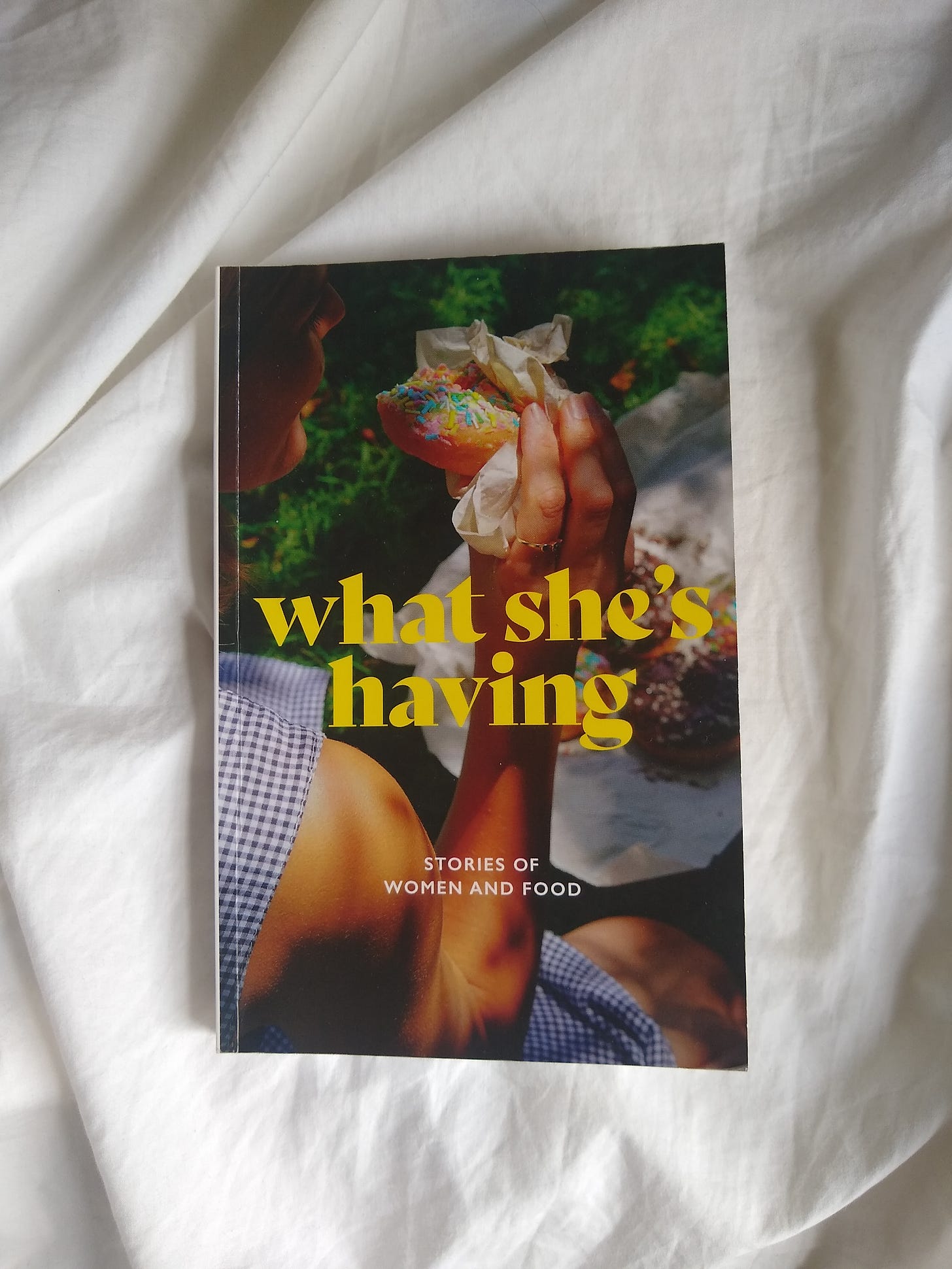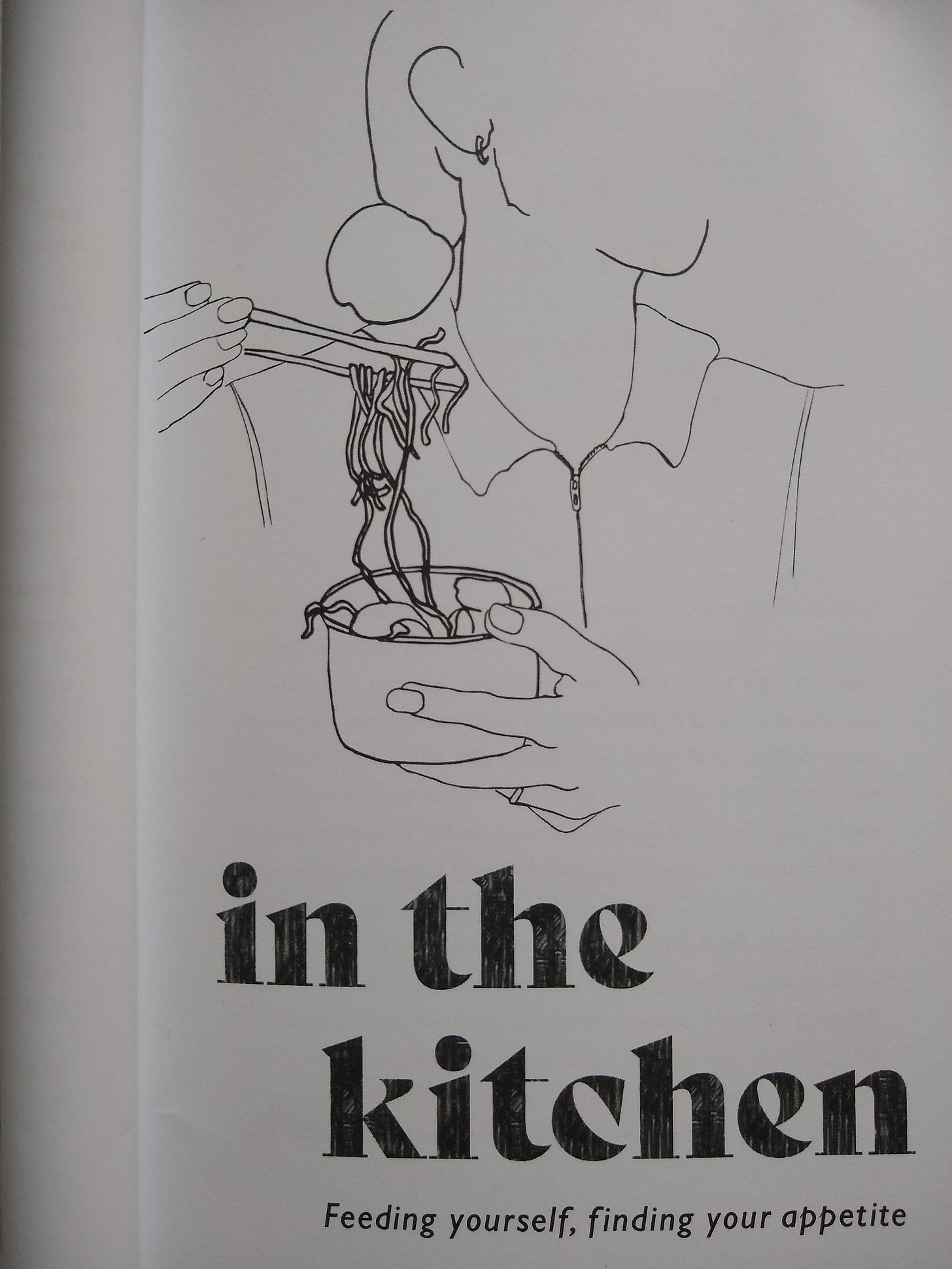Humans must eat every day. Without food we cannot survive, much less thrive. Food, however, is complicated. It is a source of both joy and shame. Whatever reaches our plates, that everyday meal we turn to when nothing else will do, is shaped by our life experiences and culture, strongly inflected by class, gender, and race. Food is mood. Food is family. Food is memory.
Food is intensely individual, down to the unique distribution of our tastebuds, an assertion of autonomy in choosing what to consume. Food is intensely communal, a manifestation of globalised processes of production, bound up with climate change, workers’ rights, and dietary norms. Many of these contradictions are explored in DearDamsels’ anthology What She’s Having: Stories of Women and Food, consisting of prose and poetry, fiction and non-fiction, by sixteen writers. The depth of emotion stirred up by food and eating is underlined by the considerate ‘Notes on Content’ section at the beginning of the book; it includes tags of ‘body image’, ‘diet culture’, and ‘death’, recurring several times across the collection.
Over the last few years, personal narrative has become hugely important in food media, from published cookbooks to Youtubers’ ‘what I eat in a day’ vlogs. These developments predate the coronavirus pandemic. Yet the confinement of many people to their homes during lockdowns, furlough, or sudden unemployment led to many shared efforts of sourdough starters and baking on social media, charting a greater awareness of the challenges and consolations that food brings in troubled times. Recently, many writers have reaped a fruitful harvest using food as a means to examine their own heritage and subjectivity. Lovely examples of this are Nina Mingya Powles’ slim volume of essays Tiny Moons: A Year of Eating in Shanghai and Michelle Zauner of Japanese Breakfast’s memoir Crying in H Mart, which I’m looking forward to reading when it’s released in the UK. In this context, What She’s Having is a welcome guest to the banquet of work that combines food writing with compelling themes of identity, interrelationships, and belonging. Abby Parsons and Bridie Wilkinson write in their editors’ letter:
[…] food can help us understand the complexities of who we are – whether it’s the joys of an elaborate meal for one, the cultural significance of eating with your hands, or the darker side of cravings.
The different authors each illustrate the intricate personal and societal dynamics involved whenever someone digs into a dish or considers their appetite, creating a rich and varied read. Nevertheless, there are some recurring points of attention. Food is a means of connecting the present to the past, from Amy Feldman poignantly describing her mostly non-practicing Jewish family’s Passover meal, to Syeda Salmah celebrating the long tradition of the way her Bengali family eat by hand, defying the othering gaze of those who deem this ‘not civilised’. In her poem ‘Remedies for Loss of Appetite’, E. V. Somerville encourages the reader:
Every one of your ancestors has gone to great lengths to get here.
Come, Beloved,
Eat.
Another vital element revolves around the opposition between cooking for others and cooking for yourself. The feelings that the former provokes depends hugely on individual character and situation, on whether this is an underappreciated act or a willing expression of affection. The opening essay, ‘M.F.K and Me’ by Ansa Khan, relates how the writer’s interest in cooking developed during her university years. Studying abroad in Dijon, where the famous food writer M. F. K. Fisher also lived briefly decades earlier, Khan is inspired by her new friend Rose when they make guacamole together. Her awakening to the possibilities of food-making illustrates her growing maturity as a young adult encountering the world on her own terms. Khan finds delight in making meals to share, appreciative of loved ones happy to eat her ‘bland creations’ in the years before she discovered seasoning.
From another angle, Kate Young’s essay ‘A Crab for One’ articulates some of the frustrations borne from the gendered expectations that it is women who will spend most of their time in the kitchen, attached to a heteronormative household, fulfilling their supposedly natural nurturing role:
Despite knowing just how much pleasure food bought me personally, there was an undeniable performativity to the role I imagined it would always play. The five hundred pages of desserts in that first cookbook weren’t for me, they were for my family … I bought it not because of what I wanted to eat, but because of … what I wanted to serve.
As an adult in her late twenties, gay and child-free in a departure from her childhood assumptions, Young gets up at 3.30am to travel across London to pick up a live crab for herself, making an impressively fiddly, slightly gruesome dinner of self-served luxury.
The ambivalence of food in relation to selfhood and interpersonal relationships is powerfully displayed in the short story ‘Prison Cake’ by Candy Ikwuwunna. It opens with Uzo trying to bring his incarcerated brother Obi a home-made carrot cake for his birthday, which is denied by the prison warden. When he gets home, ‘he eats a slice, then another, then another, until it tastes like mud on his tongue, and he throws the rest away.’ At work, a romance with his colleague Ezra is hindered by his feelings of guilt and worthlessness, demonstrated by his binge eating. With these two narrative strands, Ikwuwunna teases out the close association of food with concepts of reward and punishment, in both a systemic and individual sense.
All of this might combine to give the impression that What She’s Having is all heaviness and no levity. If every morsel is a metaphor, each bite replete with symbolism, there is a risk of losing the ability to convey food’s intrinsic sensuality. One clumsy comparison or descriptive flourish might easily create an image that is disgust-inducing rather than mouth-watering. Do not worry. This book will make you hungry. The writers that seek to celebrate the taste of food are careful with their words, giving the flavours space so as not to revolt the imaginative palate. For all its careful attention to densities of meaning, the anthology closes satisfyingly with a poem entitled ‘Life is Still’ by Sorcha Collister, evoking the pleasurable immediacy of eating. Language is refined to a simple appreciation of munching on a peach in Italy:
The concentrated stillness
And the smile of
The sugar
That slips you down the street
And leaves you with
Sticky hands and
A single moment
You can buy What She’s Having here if you’re interested, and check out more of the fab writing published online by DearDamsels as well.






Sounds like such a good read. I'm hungry already!